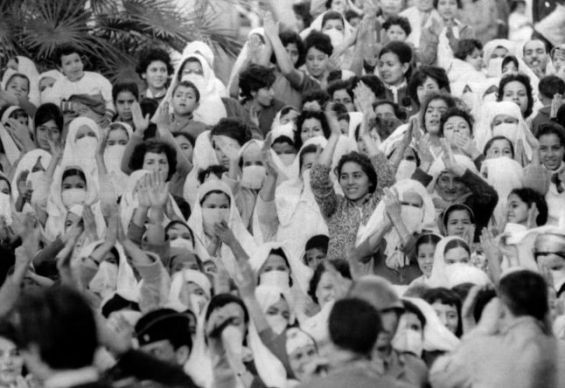Over the past three decades, women’s rights in Morocco, feminist organizations and debates about equality have made headlines and occupied political discussions.
But contrary to what many people may believe, feminist activists and women’s rights defenders started their activities in Morocco in the 1940s, during the colonial era.
Although, at the time, Moroccans’ main concern was to break free from France, women’s rights and the struggle to voice their needs and rights found its way to the Moroccan society.
The first Moroccan women's organization
On May 23 1947, in the city of Fez, Morocco’s first women’s rights organization was created. It was called Akhawat al-Safa (Sisters of Purity) and was affiliated with the Shura and Independence Party (Istiqlal). The women organization then established branches in several other cities.
Akhawat al-Safa’s creation, however, was the result of a very particular context. At the time, which was marked by the end of the Second World War, many liberation movements had seen the light, including women’s organizations.
The liberal reformist tendency of the Shura and Independence Party also paved the way for the creation of such an organization, as its thinkers linked women's rights with civilization and modernization of society and saw the liberation of women as part of their call for freedom and democracy.
«A nation’s renaissance is led by its men and women not by one group. Every revival is based on the man and not on the woman, which makes it partial, deficient, sterile, and ignorant».
More than three thousand women attended and participated in the founding conference of the «Sisters of Purity» organization, according to Muhammad Maarouf al-Dafali, and it was agreed that the movement’s headquarters would be in Fez and branches would open in other cities across the Kingdom.
The founding conference made headlines and was talked about in several African and Arab countries. The movement held its second conference on 12-13 December 1948, and then the third one in June 1951.
The organization pointed out that the Moroccan woman «lives a primitive life with no rights and stumbles in the darkness of ignorance». The movement blamed this on «myths, delusions, abuse and exhaustion» as well as the wrong understanding and «deviation of religion».
The Sisters of Purity believed that «women are one of the pillars of progress» and stressed that the development of «Morocco is based on the participation and work of women next to men in all fields».
Moreover, the organization urged women to «think differently and keep up with the pace of the times, by emancipating themselves from the secrets of the past, getting rid of being confined to household tasks and bypassing that towards highlighting their personality, accompanying the husband in all life tasks, and participating in the struggle for the homeland, which awaits the sacrifices of women».
Education and the fight against traditions
The association focused on education and believed that illiteracy was one of the main reasons behind the miserable situation of Moroccan women. It also insisted that Morocco can only achieve its goals through «educated women who are able to fulfill their duties».
The association criticized the educational system, which stipulated that girls' education should be restricted to the primary level, and considered it unhelpful, urging young girls to pursue their studies.
For those who would not want to complete their studies, it suggested that they go for a four-year study system after obtaining the elementary certificate, the first two years of which would be devoted to general education, and the last two years would focus on the rules of public health, housekeeping, child-rearing and handicrafts.
The association also linked the emancipation of women with the elimination of some customs, «by changing women's thoughts, enlightening them and enacting a kind of estrangement with the past, and combating the superstitious beliefs attached to Islam».
Hijab and how women used to dress up was also one of the ideas discussed by the «Sisters of Purity», who criticized extremism. Instead, the organization looked up to the European model.
«Miss Fatima El-Tohami is like a role model for modern Moroccan girls. She goes out unveiled, wears European clothes, rides a bike, drives a car, speaks French, Italian, and communicates in English».
Furthermore, the association asked the government to start registering marriages in Morocco and submitted a petition in this regard. It also insisted on the need to set the age of marriage for girls, and demanded to prevent them from marrying before they reach the age of sixteen. It also considered polygamy among the scourges of society and rejected it. The Sisters also suggested that women join the army, participate in the parliament and vote like men.
Disappointment
After Morocco gained independence, King Mohammed V ordered the development of a Code of Personal Status, and among those responsible for drafting it was the leader of the Independence Party, Allal El Fassi. The code, however, disappointed the association's hopes.
It kept women in an inferior position compared to men, including laws that authorized polygamy and gave men the upper hand over women.
The «Sisters of Purity» association was the only organization that objected to the new code and questioned the role of Islam, as well as the Sunnah and Islamic laws, which angered a number of sheikhs.
This stage coincided with the emergence of intense political confrontations between the Independence, Shura and Independence parties, which was marked by kidnappings and assassinations.
The Shura and Independence Party entered a dying stage, and their influence waned, and the Sisters' association too, hence its disappearance later.




 chargement...
chargement...












